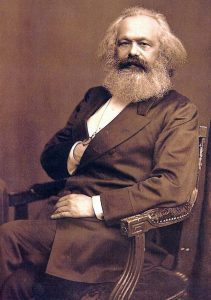Years ago when I was writing my book about Bernard Shaw, I knew I was facing a daunting task. But there was one thought that gave me solace: I didn’t have to study Karl Marx.
Although Marx’s writings were once a huge influence on Shaw’s economic and political thinking, they became less important as Shaw grew older…or so the scholars thought. Huge sigh of relief from Jean.
And then, unexpectedly, I found out that the opposite was true – a story for another day. (Preview: The starting point of the story was that James Hillman was getting over a bout with the flu. I am not making this up.)
What I discovered was that Marx had a huge effect on the way we think about language. Jacques Derrida was an avid Marxist, for example. Yes – alas – I ended up studying Karl Marx.
All of which explains why I made a point of reading an article about Marx in a recent New Yorker magazine: “Karl Marx, Yesterday and Today.”
The author, Louis Menand, specializes in language and writing, making him one of my favorite New Yorker writers. So I was astonished when I read Menand’s comment about historians who try to read Marx in the context of his own era:
The mission is worthy. Historicizing—correcting for the tendency to presentize the past—is what scholars do.
Presentize? Really, Louis?
Talk about a made-up word! If you Google presentize, you come up with…nothing. How did presentize end up in the New Yorker?
And yet…it works. Menand’s sentence has an elegant balance between historicize (an accepted word) and presentize.
(Historicize, incidentally, means “to interpret something as a product of historical development,” “to make historical,” or “to narrate as history.”)
Allow me a moment to explain why presentize shocked me so much. New words tend to have a slangy or jargonish feel, and it’s a good idea to avoid them when you’re writing for publication.
Invented words ending in –ize are a particular problem. Here’s an example I made up myself: Someone writing about cooking might be tempted to include batterize (meaning “dip in batter”) in a recipe for fried chicken. (I just Googled batterize. Mercifully no one seems to have tried to use it as a cooking term.)
So: Was it ok for Menand to coin the word presentize? Here’s the thing: After you’ve built a reputation (as Menand has done), you’re allowed to run a red light now and then.
I’m trying it myself in my latest piece about Shaw – not coining new words, but trying to inject some energy into the steady and impersonal tone you usually hear in scholarly writing. I’m not sure how well it will work, and I may end up throwing away the whole thing. But geez – it’s fun to try it!


